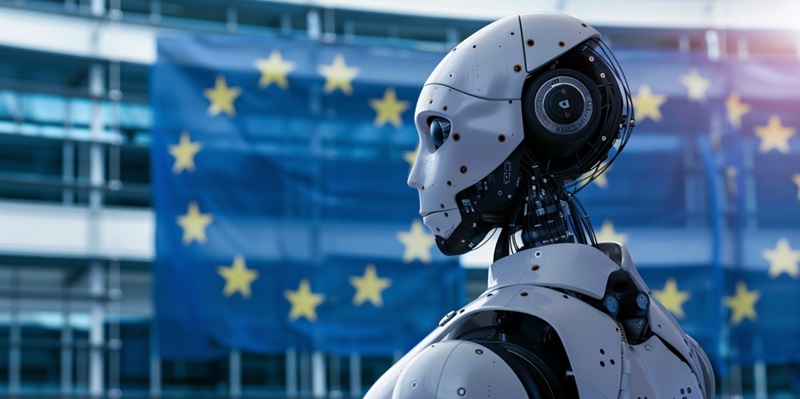In the digital epoch governed by artificial intelligence (AI), the European Union has placed itself emphatically as a regulatory vanguard in this sector. The EU AI Act introduces a new landscape of compliance, stirring a mix of intrigue and challenge for businesses. Integral to steadying these waters is the EU AI Hub, a collaborative product among industry titans including Cranium, Microsoft, and KPMG. It emerges as an essential guiding light for firms embarking on this complex legal journey.
The EU AI Act: A Paradigm Shift in AI Regulation
The Landmark EU AI Act
Marking a seminal regulatory shift, the EU AI Act underscores a rigorous governance structure for AI technologies. This act classifies AI systems, with heightened scrutiny for high-risk categories, and enumerates the requisite compliance for those operating within the EU’s jurisdiction. The act stands as a harbinger for stringent operational mandates that businesses deploying AI must heed.
The legislation bifurcates AI into varying tiers of risk, subjecting high-stakes AI operations to a set of stringent protocols. These safeguards are crafted to mitigate risks and protect the rights of EU citizens, casting a long shadow on how AI can be ethically and lawfully utilized within the Union.
Phased Implementation and Impact
The EU’s strategic phased implementation of their AI Act provides enterprises with a structured compliance timeline. While this staggered approach confers time to adjust, it coexists with the implicit threat of stiff sanctions for those found in violation. Fines could be crippling, aligning with the gravest of financial deterrents, reaching upwards to either 6% of a firm’s annual income or 30 million euros, whichever is greater.
This timeline allows a period for companies to understand and integrate the necessary protocols into their AI-powered services. Yet the onus is on businesses to stay vigilant and proactive in aligning with each phase, ensuring a seamless transition into full compliance.
The Inception of the EU AI Hub
A Tripartite Collaboration to Navigate AI Legislation
The inception of the EU AI Hub marks a dynamic alliance between Cranium’s software prowess, Microsoft’s technological landscape, and KPMG regulatory acumen. This synergy is designed to finesse the process companies must undergo to adhere to the AI Act’s intricate demands.
This trilateral venture seamlessly merges the capabilities of its constituting firms to create an unparalleled resource. The hub will serve as an informational and operational nexus, aiding businesses to demystify and navigate the evolving regulatory landscape of AI tech.
Services and Solutions Offered by the AI Hub
The EU AI Hub proposes a suite of tools and advisory services instrumental for the enactment of compliance strategies. From advanced developmental tools to meticulous deployment assistance, the hub stands as a comprehensive pillar supporting businesses facing this novel regulatory environment.
The hub’s offerings will extend beyond mere advisory, embedding within the organizational fabric of their clients tools and systems aimed at sustaining compliance. In a terrain where regulations evolve rapidly, having access to such tailored insights and resources can be invaluable for businesses intending to remain compliant.
Addressing the Legal and Technological Complexity
The Interplay with Existing Legislation
The nuanced sphere of the EU AI legislation does not exist in isolation—it coalesces with other fundamental regulations like the GDPR. The EU AI Hub will thereby serve as an integrative platform, harmonizing the demands of the AI Act with those of existing laws.
Firms will confront a legislative collage requiring masterful navigation. The hub’s mission reflects the necessity to provide clarity and coherence, ensuring that AI deployment not only complies with the new AI Act but also resonates harmoniously with prevailing data protection and digital services regulations.
Guidance for International Firms
In a global economy, the EU’s legislative prerogatives extend beyond its geographical bounds, affecting international corporations that engage with the EU market. The AI Hub is set to provide pivotal orientation, helping external entities rise to the EU’s exacting standards.
This guidance will prove critical for firms globally, aiding in the preemptive alignment with the EU’s regulatory arm. As the AI Act’s global influence proliferates, the hub will become an even more indispensable compass for entities looking to steer clear of noncompliance across international waters.
The Anticipated Global Influence of EU AI Regulation
Comparisons to GDPR’s Global Impact
Just as GDPR set a global benchmark for data privacy, the EU AI Act is anticipated to cast substantial influence on AI governance globally. Businesses around the world need to be attuned to the EU’s stringent regulatory measures as they may soon pervade numerous jurisdictions.
The global aftershock of GDPR is indicative of the potential trajectory for the AI Act’s influence. The hub emerges as a bulwark, preparing businesses for a reality where EU-led AI norms become practices to emulate internationally.
Steering Through a Fragmented Regulatory Future
In today’s digital era, marked by the surge of artificial intelligence, the European Union has stepped forward as a key regulator within the AI landscape. Its AI Act is setting the standard for legal compliance, capturing the attention and consideration of enterprises worldwide. To navigate this new terrain, the EU AI Hub has been established, with the involvement of leading entities such as Cranium, Microsoft, and KPMG. This hub acts as a crucial resource for companies to align with the intricate regulations introduced by the Act. As businesses delve into the complexities of compliance, the EU AI Hub stands as a beacon, providing guidance and clarity in a transformative time for AI governance. This alliance positions the EU at the forefront of managing AI advancements, ensuring a balance between innovation and regulation.

